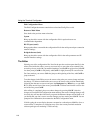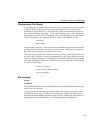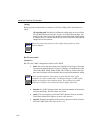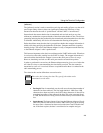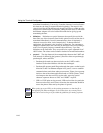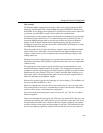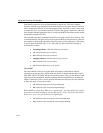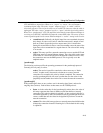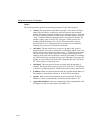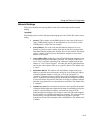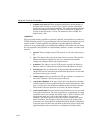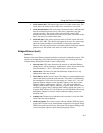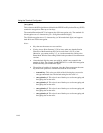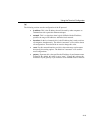
Using the Terminal Configurator
A-14
[telnet]
The following section specifies the operating parameters for the Telnet protocol.
• connect. This entry dictates what kind of prompt is seen on the serial port
output. The two choices available are: wait for keystroke and command
prompt. The default command prompt will give a prompt "telnet>", much like
the Telnet software prompt on a UNIX system. From this prompt, using the
“open” command will then connect the device to a particular machine. For
example, typing “open 10.10.10.129” will open a Telnet session to the
machine with the IP address 10.10.10.129. The second choice wait for
keystroke allows for a configuration that only connects to one machine,
requiring only a key press to initiate the connection.
• wait data 1. The text for this entry is used as a prompt in the "wait for
keystroke mode". The value is specified as a combination ASCII values. The
default value is "Press any key to connect to host..." (The double-quote marks
are a part of this value, unlike in previous examples.) Binary data can be
added by writing data as hex or decimal, outside of quote marks. For example,
the ANSI clear-screen command string (escape, left-bracket, H, escape, left-
bracket, J) can be added to the front of this string like this: 0x1b "[H" 0x1b
"[J" "Press any key to connect to host..."
• wait data 2. This entry states what text to display after the keystroke is
received. The format of the data is the same as in “wait data 1”. The default
is “0xd 0xa” (without the quotes), which will move the cursor to the next line.
• ip address. When in wait for keystroke mode, this specifies the IP address of
the machine to automatically connect to. 10.10.10.129 is the default.
• tcp port. When in wait for keystroke mode, this specifies the TCP port
number to connect to automatically. The default is port number is 23.
• reopen after shutdown. After one connection has been completed this value
will appear and ask to connect again. The default is on.



